American Economic Association Does Not Allow Racial References in Job Postings
 The American Economic Association (AEA) lists job openings for economists in academia on its Web site. (Click here to see the listings.) According to a report in Inside Higher Ed, a recent opening insert submitted by the University of Vermont to the AEA included a customary statement at the end which read, the university “welcomes applications from women and underrepresented ethnic, racial, and cultural groups and from people with disabilities.” Note that the listing simply states it “welcomes applications” from particular groups. The listing does not say that any group is favored or will receive preferential consideration. The American Economic Association (AEA) lists job openings for economists in academia on its Web site. (Click here to see the listings.) According to a report in Inside Higher Ed, a recent opening insert submitted by the University of Vermont to the AEA included a customary statement at the end which read, the university “welcomes applications from women and underrepresented ethnic, racial, and cultural groups and from people with disabilities.” Note that the listing simply states it “welcomes applications” from particular groups. The listing does not say that any group is favored or will receive preferential consideration.
Yet the AEA struck the statement from the job notice on the grounds that it gave the impression that certain groups were favored. The AEA states that it will publish notices that say a university is an equal opportunity employer or favors diversity. But it will not allow the mention of any particular group.
After a number of minority economists criticized the AEA position, the organization said that it would study whether it should institute a change in policy.
JBHE research shows that blacks make up only 1.6 percent of the economists teaching at America’s 30 highest-ranked universities.
  |
“At a university remembered for a governor’s attempt at segregation, blacks and whites still mix about as well as oil and water.”
— a report in the Crimson White, the student newspaper at the University of Alabama at Tuscaloosa, December 8, 2006
|
The Trend in Black Student Graduation Rates at Liberal Arts Colleges
 Last week we reported the overall positive trend in black student graduation rates at the nation’s highest-ranked universities. Now we turn to the progress at the nation’s leading liberal arts colleges. Last week we reported the overall positive trend in black student graduation rates at the nation’s highest-ranked universities. Now we turn to the progress at the nation’s leading liberal arts colleges.
In 2006, 15 of the 24 high-ranked liberal arts colleges in our survey have shown an improvement in black student graduation rates from their 1998 rates. At Macalester College in Minnesota, there was a huge 22 percentage point improvement in the eight-year period, from 62 percent to 84 percent. At Oberlin, Grinnell, Wellesley, Davidson, Bryn Mawr, Trinity, and Smith, the black student graduation rate improved by 10 percentage points or more over the past eight years.
Eight highly ranked liberal arts colleges saw a decline in black student graduation rates over the past eight-year period. By far the largest drop was at Haverford College in Pennsylvania. In 1998 the school posted a black graduation rate of 93 percent. This year the African-American student graduation rate dropped to 81 percent.
Vassar College and Carleton College have also shown significant decreases in their black student graduation rates in recent years.
The Snail-Like Progress of Blacks Into Higher Education Faculty Ranks
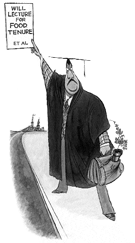 According to the most recent data from the U.S. Department of Education, in 2003 there were 33,137 African Americans serving in full-time faculty positions at colleges and universities in the United States. They made up 5.3 percent of all full-time faculty in American higher education. Thus, while blacks make up 12 percent of the total enrollments in higher education, the black presence in faculty ranks is less than half the black enrollment figure. According to the most recent data from the U.S. Department of Education, in 2003 there were 33,137 African Americans serving in full-time faculty positions at colleges and universities in the United States. They made up 5.3 percent of all full-time faculty in American higher education. Thus, while blacks make up 12 percent of the total enrollments in higher education, the black presence in faculty ranks is less than half the black enrollment figure.
The Department of Education data also shows that while blacks are increasing their number of faculty posts, the progress has been slow. A quarter-century ago in 1981, blacks were 4.2 percent of all full-time faculty in American higher education. Today the figure is 5.3 percent.
Here is the bad news: If we were to project into the future the progress blacks have made into full-time faculty positions over the past quarter century, we find that it will take about 140 years before the percentage of black full-time faculty equals the current percentage of the black population in the United States.
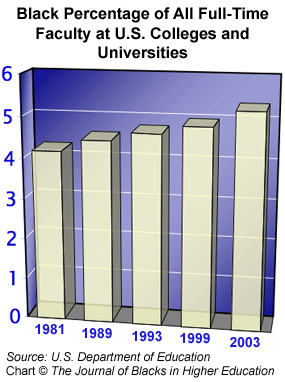

University of Wyoming
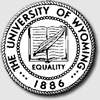
Elementary Literacy Education (Extended Term Academic Professional Lecturer)
Extended term, non-tenure track position. Qualifications: Earned graduate degree from a recognized program in teacher education with focus on literacy; effective communication skills; experience working with pre-service teachers; 3 years of classroom teaching experience at prek-6 levels that includes literacy instruction. Preference for a doctorate in literacy education and experience teaching at the college level.
Responsibilities: Active involvement as an interdisciplinary team member teaching general and content specific pedagogy in elementary literacy, and work in the public schools in collaboration with in-service and pre-service teachers. Included in this teaching responsibility is a willingness to travel to school sites within the state. Other responsibilities include advising and maintaining currency of knowledge through a program of professional development. Salary is competitive. Apply to Dr. Deb Parkinson (307) 766-3105 or debpark@uwyo.edu.
The University of Wyoming College of Education is strongly committed to attracting a diverse pool of faculty where cultural experiences and competencies are valued. More information is available at the college's website http://ed.uwyo.edu.
The University of Wyoming is an Affirmative Action, Equal Opportunity employer.

Percentage of Black Athletes in College Sports Is Increasing
New data from the National Collegiate Athletic Association finds that blacks are increasing their percentage of all athletic scholarships in college sports. In 2006 blacks were nearly 13 percent of the American population. They were about 12 percent of all college enrollments but they made up 23.7 percent of all students on college athletic scholarships.
In some sports the percentage of black athletes is even greater. For example, in 2005 blacks made up 55.3 percent of all athletes on football scholarships at the NCAA’s Division I schools. In basketball 62.6 percent of the men and 44.1 percent of the women on basketball scholarships were black. Blacks made up 28.0 percent of the men and 32.2 percent of the women on track scholarships.
The black percentage of scholarship athletes in these sports has increased significantly in recent years.
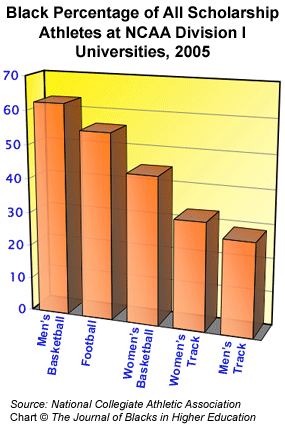
The New President of Washington State University
 Elson S. Floyd was named the tenth president of Washington State University. He will assume the post this summer upon the retirement of current president V. Lane Rawlins. Floyd is currently the president of the four-campus University of Missouri system. He previously served as executive vice president of Eastern Washington University. Elson S. Floyd was named the tenth president of Washington State University. He will assume the post this summer upon the retirement of current president V. Lane Rawlins. Floyd is currently the president of the four-campus University of Missouri system. He previously served as executive vice president of Eastern Washington University.
Floyd will be the first African American to serve as president of the four-campus Washington State University. The main campus at Pullman has close to 20,000 undergraduate students. Less than 3 percent of the student body is black. Floyd is a native of Henderson, N.C. He holds a bachelor’s degree in political science and speech, a master’s degree in adult education, and a doctorate in higher and adult education, all from the University of North Carolina at Chapel Hill.
Floyd will earn an annual salary of $600,000.
  |
54% The percentage of all African-American adult women in 1970 who were married.
35% The percentage of all African-American adult women in 2005 who were married.
source: U.S. Bureau of the Census
|
The Higher Education of NASA’s Latest Black Space Explorers
This month’s mission of the space shuttle Discovery was the first time that two African Americans were in space at the same time. Astronauts Robert L. Curbeam and Joan Higginbotham were among the seven-person crew which docked with the international space station.
 Curbeam, an astronaut since 1994, has been in space twice before. He is a graduate of the U.S. Naval Academy with a degree in aerospace engineering. He also holds a master’s degree in aeronautical engineering from the Naval Postgraduate School. After successfully completing the Navy’s “Top Gun” school for fighter pilots, he became an instructor at the Naval Academy. Curbeam, an astronaut since 1994, has been in space twice before. He is a graduate of the U.S. Naval Academy with a degree in aerospace engineering. He also holds a master’s degree in aeronautical engineering from the Naval Postgraduate School. After successfully completing the Navy’s “Top Gun” school for fighter pilots, he became an instructor at the Naval Academy.
 Higginbotham is the third black woman to fly in space. She is a graduate of Southern Illinois University at Carbondale. There, she earned a degree in electrical engineering. She also holds a master’s degree in engineering management and space systems from the Florida Institute of Technology. Higginbotham is the third black woman to fly in space. She is a graduate of Southern Illinois University at Carbondale. There, she earned a degree in electrical engineering. She also holds a master’s degree in engineering management and space systems from the Florida Institute of Technology.
In Memoriam
Benjamin S. Ruffin (1942-2006)
 Benjamin S. Ruffin, the only African American to serve as chair of the University of North Carolina board of governors, died earlier this month at his home in Lewisville, North Carolina. Ruffin suffered a heart attack while jogging. He was 64 years old. Benjamin S. Ruffin, the only African American to serve as chair of the University of North Carolina board of governors, died earlier this month at his home in Lewisville, North Carolina. Ruffin suffered a heart attack while jogging. He was 64 years old.
Ruffin was born in Durham. His father was an alcoholic and his mother supported the family as a domestic household worker. After attending racially segregated public schools, he enrolled at North Carolina Central University, the historically black educational institution in Durham. While in college he was active in the civil rights movement.
After college, Ruffin worked as an aide to North Carolina Governor Jim Hunt. After serving as director of the Durham Housing Authority, Ruffin took an executive position at the North Carolina Mutual Life Insurance Company. He later became vice president of R.J. Reynolds Tobacco Company.
In 1998 Ruffin was named to chair the University of North Carolina board of governors. In that position he was outspoken in his views that the university needed to be more inclusive and offer increased educational opportunities for blacks and low-income North Carolinians. He served two terms as board chair. Since 2002 Ruffin had headed his own consulting company.
Awards
 • Haywood L. Brown, Roy T. Parker Professor of Obstetrics and Gynecology at Duke University Medical Center, received the Alumni Excellence Award from North Carolina A&T State University. A 1974 graduate of North Carolina A&T, Brown went on to earn a medical degree from Wake Forest University School of Medicine. • Haywood L. Brown, Roy T. Parker Professor of Obstetrics and Gynecology at Duke University Medical Center, received the Alumni Excellence Award from North Carolina A&T State University. A 1974 graduate of North Carolina A&T, Brown went on to earn a medical degree from Wake Forest University School of Medicine.
 • Gerald R. Fricks, executive director of the Oklahoma chapter of Mothers Against Drunk Driving, received the distinguished alumnus award from Texas Tech University in Lubbock. He is the first African American to win the award who was not an athlete at Texas Tech. • Gerald R. Fricks, executive director of the Oklahoma chapter of Mothers Against Drunk Driving, received the distinguished alumnus award from Texas Tech University in Lubbock. He is the first African American to win the award who was not an athlete at Texas Tech.
Grants
• Johns Hopkins University received a five-year, $2.75 million grant from the National Science Foundation for its Partnership for Research and Education in Materials program. The PREM program seeks to increase the number of black and other minority students in the study of nanomaterials, objects less than a billionth of a meter in size. Johns Hopkins scientists will team up with faculty members at Howard University for the project. Undergraduate students at Howard and and at the predominantly black Prince George’s Community College will be encouraged to study nanomaterials.
• Fayetteville State University, the historically black educational institution in North Carolina, received a $222,480 grant from the Cumberland County Partnership for Children. The grant will be used by the School of Education for a preschool program at the university’s Early Childhood Learning Center.
 • Xavier University, the historically black educational institution in New Orleans, received a three-year, $570,000 grant from the Corporation for National and Community Service. The funds will be used to coordinate volunteer programs for college students to come to New Orleans during their spring break to help with recovery and restoration efforts due to Hurricane Katrina. • Xavier University, the historically black educational institution in New Orleans, received a three-year, $570,000 grant from the Corporation for National and Community Service. The funds will be used to coordinate volunteer programs for college students to come to New Orleans during their spring break to help with recovery and restoration efforts due to Hurricane Katrina.
|

Big Deficit in Unmet Financial Need for African-American College Students
Data from the U.S. Department of Education shows that there is a large amount of unmet financial need for African-American college students. This unmet financial need necessarily forces many black students to drop out of college for the simple reason that they cannot afford it.
The financial aid data shows that when all financial aid sources are taken into account, blacks on average have $4,900 in unmet need which they must pay in order to attend college. In 2005 the median income of all black families in the United States was $30,858. That means that half of all black families in this country earn less than this figure. It is virtually impossible for a family with an income of under $30,000 to come up with $4,900 to help pay college tuition and fees. Yet this is the average amount of unmet need that black undergraduates are required to pay each year.
It is also important to note that this average unmet need figure includes those students enrolled in two-year community colleges. If we look at private, four-year colleges, the unmet financial need of black undergraduates rises significantly. At non-doctorate-granting private colleges and universities, the average unmet need for black students is $6,700. For the large research universities that grant doctoral degrees, the average unmet need for black undergraduates is $8,100.
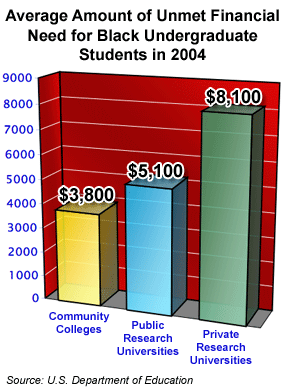
The Gender Gap in Black Ph.D. Awards
As is the case in almost every measure of African-American higher education, black women have come to hold a large lead in doctoral awards. As recently as 1977, black women earned only 38.7 percent of all doctorates awarded to African Americans. By 2000 black women earned 65.7 percent of all doctorates awarded to African Americans. This is the highest percentage of African-American doctoral awards earned by women in U.S. history. Black men narrowed the gap in both 2001 and 2002. But in 2003 and 2004 black women upped their percentage of all doctorates earned by African Americans. In 2005, 64.9 percent of all African-American doctorates were earned by women.
Since 1990 African-American women have increased their number of Ph.D. awards from 550 to 1,096. This is an increase of 99 percent. In contrast, the number of Ph.D. awards to African-American men increased from 351 in 1990 to 592. This is a rise of 68.7 percent.
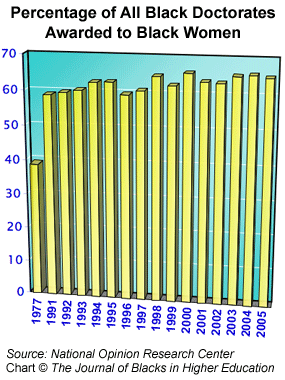
Virginia State University Awards Its First Doctoral Degree
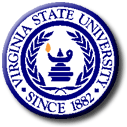 In 1882 the Virginia Normal and Collegiate Institute was founded in Petersburg as a coeducational state-operated school for Negroes. It awarded its first bachelor’s degree in 1889. In 1902, at a time when Booker T. Washington was putting his bet on Negro industrial education, the college curriculum was suspended and the name of the institution was changed to the Virginia Normal and Industrial Institute. It was not until 1923 that college-level courses were restored. In 1930 the institution was renamed the Virginia State College for Negroes. It assumed university status in 1979 when it offered its first master’s degree program. In 1882 the Virginia Normal and Collegiate Institute was founded in Petersburg as a coeducational state-operated school for Negroes. It awarded its first bachelor’s degree in 1889. In 1902, at a time when Booker T. Washington was putting his bet on Negro industrial education, the college curriculum was suspended and the name of the institution was changed to the Virginia Normal and Industrial Institute. It was not until 1923 that college-level courses were restored. In 1930 the institution was renamed the Virginia State College for Negroes. It assumed university status in 1979 when it offered its first master’s degree program.
Earlier this month the university awarded its first doctoral degree. Michelle Belle, director of human resources for the Cumberland County school system, received a doctorate in educational administration and supervision.
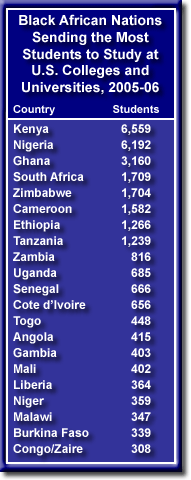 African Nations Sending the Most Students to Colleges and Universities in the United States African Nations Sending the Most Students to Colleges and Universities in the United States
According to a new survey by the Institute of International Education, in the 2005-06 academic year, 49 black African nations sent college students to study at U.S. colleges and universities.
Among black African nations, Kenya in 2005-06 sent the most students to American colleges and universities. In that period, 6,559 Kenyans were studying here.
Nigeria ranked second, sending 6,192 students to the United States. Nigerian enrollments are up by more than one third over the past four years.
Ghana, Zimbabwe, South Africa, Tanzania, Cameroon, and Ethiopia each had more than 1,000 students studying in this nation. Zambia, Senegal, Cote d’Ivoire, and Uganda all sent at least 500 students to study at U.S. colleges and universities.
Black College Establishes Five-Year, Dual-Degree Program in Mathematics and Engineering
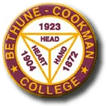 Bethune-Cookman College, the historically black educational institution in Daytona Beach, Florida, has entered into a unique agreement with the University of South Florida in Tampa. Under the arrangement, students can spend their first three years at Bethune-Cookman College studying mathematics. They will then transfer to the College of Engineering at the University of South Florida for a two-year engineering program. At the conclusion of the five-year undergraduate program, students will receive a bachelor’s degree in mathematics from Bethune-Cookman College and a second bachelor’s degree in engineering from the University of South Florida. Bethune-Cookman College, the historically black educational institution in Daytona Beach, Florida, has entered into a unique agreement with the University of South Florida in Tampa. Under the arrangement, students can spend their first three years at Bethune-Cookman College studying mathematics. They will then transfer to the College of Engineering at the University of South Florida for a two-year engineering program. At the conclusion of the five-year undergraduate program, students will receive a bachelor’s degree in mathematics from Bethune-Cookman College and a second bachelor’s degree in engineering from the University of South Florida.
Two African Americans Win Marshall Scholarships
In 1953 the Marshall Scholarships program was established by an act of the British Parliament. Funded by the British government, the program is a national gesture of thanks to the American people for aid received under the Marshall Plan, the U.S.-financed program that led to the reconstruction of Europe after World War II. Each year about 40 Marshall scholarships are awarded to American students who are planning to earn either a second bachelor’s degree or a graduate degree at a British university.
This academic year the Marshall Foundation selected 43 winners. Two of the 43 Marshall scholars are African Americans.
 • Anthony Hendricks of Lawton, Oklahoma, is a senior majoring in speech communications at Howard University. Next fall he will study economics and political science at the London School of Economics. • Anthony Hendricks of Lawton, Oklahoma, is a senior majoring in speech communications at Howard University. Next fall he will study economics and political science at the London School of Economics.
Hendricks was born in Louisiana but raised in Oklahoma. His mother is a preschool teacher and his father is a retired Army officer. He hopes to one day run for elective office.
 • Shanti A. Zaid is a graduate of Michigan State University. At Michigan State, Zaid joined the African Atlantic Research Team and made five trips to Cuba to study cultural and spiritual practices. • Shanti A. Zaid is a graduate of Michigan State University. At Michigan State, Zaid joined the African Atlantic Research Team and made five trips to Cuba to study cultural and spiritual practices.
Zaid will continue his education pursuing a master’s degree in social anthropology at the School of Oriental and African Studies in London. He plans to earn a doctorate and points toward a career in the academic world.

Monroe Community College

Dean, Liberal Arts
The Division Dean is the chief administrator of the division and reports to the Academic Vice President. The Dean has responsibility for the quality of the courses, programs, activities, faculty, staff, and resources of the division. The Dean promotes collegiality and links the division’s concerns, interests, and objectives to the mission of the College, the strategic plan and the needs of the community.
Qualifications:
• Minimum of a Master’s Degree in a Liberal Arts discipline required. Earned Doctorate preferred.
• Six years experience in higher education, including experience as an effective college teacher (with evidence of use, or knowledge, of multiple teaching strategies) and experience as an educational administrator (e.g., chair, assistant dean, associate dean, or dean).
• Familiarity with the programs of the departments in the division. (Anthropology/History/Political Science/Sociology, English/Philosophy, Mathematics, Psychology, Visual and Performing Arts, Honors Program)
• Demonstrated knowledge of current issues and trends in post-secondary education.
• Promise of leadership capabilities and commitment to continued professional growth.
• Demonstrated commitment to supporting an inclusive environment on campus.
Evidence of:
• Commitment to the philosophy of a comprehensive community college including the role of liberal arts in the community college.
• Effective interpersonal, communication, critical thinking, problem solving, team building, and mediation skills.
• Promise of leadership capabilities and commitment to continued professional growth.
• Administrative experience and leadership in all areas pertinent to running a division including areas such as supervision, budget planning, evaluation, collaboration and curriculum design.
• Proficiency with technology and understanding of the application in the classroom and presentations.
Screening will commence immediately and continue until position is filled. Application packet should include: letter of application, resume, list of three references with contact information, unofficial transcript(s), and statement of philosophy regarding the role of Liberal Arts in today’s community college. (Official transcripts required upon hire) Mail to: Director of Human Resources, Monroe Community College, 1000 E. Henrietta Rd., Rochester, NY 14623. 585-292-2048.
Monroe Community College is a unit of the State University of New York. AA/EOE/SUNY

Appointments
 • A. Toy Caldwell-Colbert was named provost and vice president for academic affairs at Central State University, the historically black educational institution in Wilberforce, Ohio. She previously served as provost at Howard University. • A. Toy Caldwell-Colbert was named provost and vice president for academic affairs at Central State University, the historically black educational institution in Wilberforce, Ohio. She previously served as provost at Howard University.
Dr. Caldwell-Colbert is a graduate of Spelman College. She holds a master’s degree and a Ph.D. in clinical psychology from the University of Georgia.
 • Marlon C. Lynch is the new chief of campus police at Vanderbilt University in Nashville, Tennessee. He has served as assistant chief since August 2005. He previously was chief of campus police at the University of North Carolina at Charlotte. • Marlon C. Lynch is the new chief of campus police at Vanderbilt University in Nashville, Tennessee. He has served as assistant chief since August 2005. He previously was chief of campus police at the University of North Carolina at Charlotte.
Lynch is a graduate of Michigan State University and holds a master’s degree in criminal justice from Boston University.
 • Mamadou Diouf was named director of the Institute for African Studies at Columbia University’s School of International and Public Affairs. Professor Diouf also will join the faculty of the Department of Middle East and Asian Languages and Culture. His appointment is effective in July. • Mamadou Diouf was named director of the Institute for African Studies at Columbia University’s School of International and Public Affairs. Professor Diouf also will join the faculty of the Department of Middle East and Asian Languages and Culture. His appointment is effective in July.
Diouf is currently a professor of history at the University of Michigan and also teaches African-American and African studies courses.
A native of Senegal, Diouf earned his Ph.D. at the Sorbonne.
 • Mark Kiel was appointed interim vice chancellor of development and university relations at North Carolina A&T State University in Greensboro. A certified public accountant, Kiel has served as an associate professor of accounting at the university since 2004. • Mark Kiel was appointed interim vice chancellor of development and university relations at North Carolina A&T State University in Greensboro. A certified public accountant, Kiel has served as an associate professor of accounting at the university since 2004.
Kiel is a graduate of Alabama State University. He holds an MBA from Atlanta University and a Ph.D. in accounting from the University of Georgia.
• Edward McLean was named director of athletics at Fayetteville State University in North Carolina. He was the director of athletics at Elizabeth City State University.
McLean holds bachelor’s and master’s degrees from North Carolina Central University. He earned a doctorate at the University of Tennessee.
|
 .
.